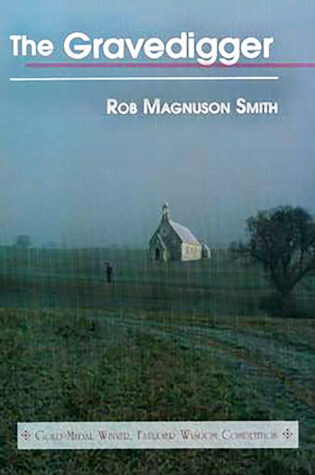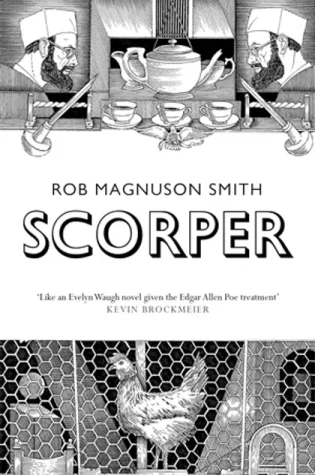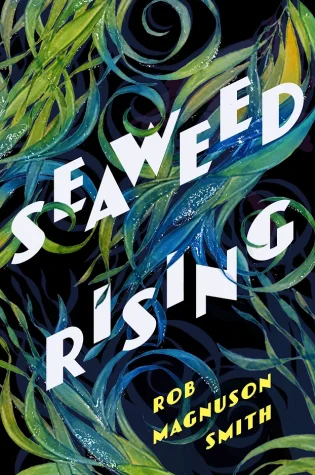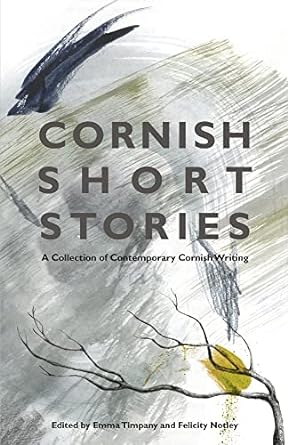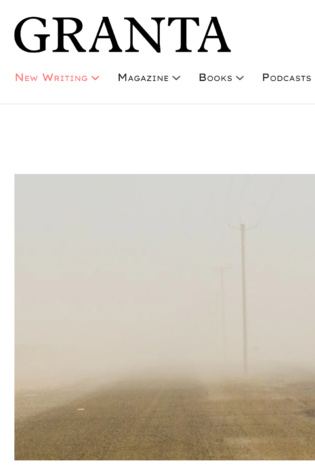Interview with Rob Magnuson Smith
Author
Questions by Peter McAllister
Can you tell us a little about your writing process, please? Where do you write from? What’s that space like? How do you approach each day of writing?
I write mostly from home, onboard a converted herring trawler moored on the Penryn River. It’s peaceful, if a little wet. My nearest neighbours are birds, fish and seaweeds.
I’ve been lucky all my life—I’ve always wanted to write and don’t have to force it. I don’t exactly enjoy the process, but I find it necessary, like breathing or paying the bills. If I’m going hard at a project, there won’t be too many breaks between morning and evening. New material to start the day. Notes on future chapters wherever I happen to be—up at the university between classes, or at night, down at the pub. I’m a tinkerer. I revise until I can’t see the print for the page. For me, writing also involves giving way. I often stare mutely at the latest batch of seaweeds, waiting for their inevitable intervention.
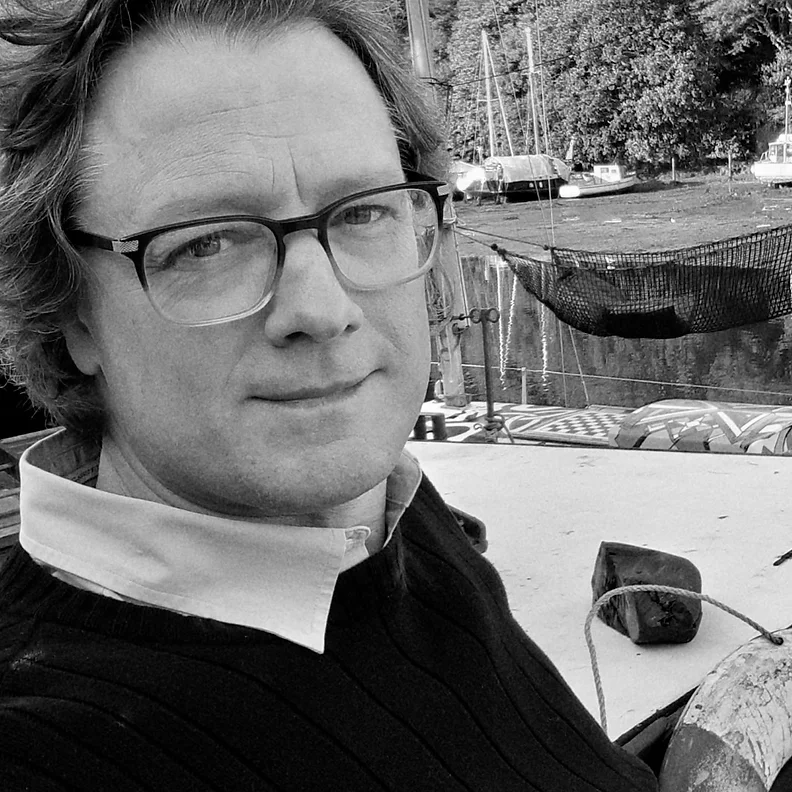
Read Rob Magnuson Smith’s
‘Why I Write and Why I Drink’
You write a mixture of novels and short stories. Do you have a preference for one? What do you get that’s different from writing each form?
I like both forms. Flannery O’Connor said that short stories should have no less meaning than a novel, with nothing essential left out. I guess a story and a novel require roughly the same urge to create something from nothing. The only difference is estimated completion time. Stories start out as little excursions and stay there. City breaks, say. If they swallow up your brain for months instead of weeks, they can become novels. Settings get granular. The small digression becomes the extended subplot. You start preparing for a long road trip with your characters, many of whom you don’t like or trust all that much. Some of them will take over by the time you arrive.
Place/environment is a major focus in your writing, one which really heightens the experience we have with your characters. How do you choose, describe and leverage your settings so well?
‘Leverage’ is an interesting word with regard to setting. I’m not sure I think about it that clinically, but maybe I do unconsciously.
How setting develops for me: I start with a protagonist, in a Poe-like predicament, then the right location suggests itself. I build the world out and return frequently to the minutia of place, the scene of the original sin. I tend toward making a postage stamp reality rather than some Kafkaesque Nowhere-land. My early stories were set in the Willamette Valley of Oregon because that’s where I partly grew up. Lately I’ve been setting my work in West Cornwall. Tomorrow, who knows? Could be the hometown of whoever buys my next pint.
As well as a published writer, you also teach Creative Writing at the University of Exeter. How do you feel these two professions work alongside each other?
University life and writing fiction make for good companions. I’ve got a pet peeve: all the writers who draw their salary from a university, then scrub their jobs from their identities to somehow appeal to a wider audience. What a joke. Own your world. Teaching is an honour. Teaching is a career triumph.
If selling insurance (Wallace Stevens), or being a medical doctor (Anton Chekhov), or driving a bus (Magnus Mills) can ‘work alongside’ writing, why can’t teaching? The world has become too precious about the supposed nature of the artist. It’s a myth! Since the beginning of time, artists have shared their work for feedback, support, guidance. That’s what happens in a creative writing workshop. I learn from my students every day. If you can’t say that, I’m sorry, you’re probably a shit writer and a shit teacher to boot.
Who are your favourite short story writers and why?
John Cheever: the familiar place, the broken estate, the fateful moment
Flannery O’Connor: divine grace, dark humour and a love for the unforgiven
Anton Chekhov: a prosaic day in the life becomes a portrait of life as a whole
JD Salinger: economy of line, character propulsion, oblique dialogue
Xiaolu Guo: precise admixture of situational absurdity and philosophical depth
We’re proud to be publishing a piece of life-writing that you’ve produced for INKFISH called ‘Why I Write and Why I Drink.’ It gripped us from beginning to end. To what extent does your fiction feature elements of your life experience?
Boy, that’s a loaded one. To be honest, not a whole lot. I seldom follow the maxim of writing what you know. Maybe it says something about me that I prefer to experiment with each piece. That said, every artist projects elements of themselves into their work, even if unconsciously.
Many of my Silt, Oregon stories feature episodes from childhood—like Second Skull or Farm Tennis. My novels serve as personal laboratories for the exploration of ideas. The Gravedigger is how I imagine romantic love in the face of death. Scorper is my vision of Ditchling, Sussex from the other side of the Atlantic. Seaweed Rising is what our planet will look like if algae continue as advertised.
What are you working on at the minute?
I’m on the final draft, God willing, of a novel called Carrick Roads. The setup is an American caught in Cornwall. He inherits a ridiculously large boat and can’t escape. Maybe I’m writing my life experiences after all.
What advice can you give to other writers trying to ‘make it’ today?
First of all, don’t be shy about identifying yourself as a writer. Carry a notebook and ignore anyone stupid enough to think it makes you pretentious. Don’t gum yourself up with doubt. Play close attention as you make your way through the world.
Nurse your grievances. ‘Leverage’ them, if you must. Write in response to each setback or betrayal. Play into your strengths: if you’re poetically inclined, allow your language to veer into metaphor. If you’re good at plot, devise a few unexpected twists. Work on your weaknesses: if you have a tin ear for dialogue, eavesdrop without shame. Take detailed notes: each situation is a potential story, each person a character.
Most importantly—and this shouldn’t come as a surprise from a proudly out academic—read, and read widely. Read fiction for structure as much as for content. Survey the genres: historical, detective, sci-fi, fiction in translation. Study nonfiction for how certain narratives get communicated. Skim the baby books for character names. Read teaching manuals, conference proceedings, newspaper articles, your grandmother’s love letters. All material can be woven into your story’s fabric. Develop a distinctive voice and revise until you’re blue in the face. Then submit, and keep the faith as the rejections roll in, because one day you’ll be published, and skipping off to the pub for a well-earned pint and the strength to push on.
About Rob Magnuson Smith
Rob Magnuson Smith is the author of The Gravedigger (Pirate’s Alley William Faulkner Award) and Scorper (Granta Books). Scorper was described by the Independent on Sunday as ‘an odd, original, darkly comic novel… Kafka crossed with Flann O’Brien’. His third novel Seaweed Rising appears in November 2023.
Rob’s short fiction has appeared in Granta, The Saturday Evening Post, Ploughshares, the Australian Book Review, the Guardian, Cornish Short Stories (The History Press), Fiction International, Guillemot Press and elsewhere. He has won the Elizabeth Jolley Award and been longlisted for the Sunday Times EFG Short Story Award.


